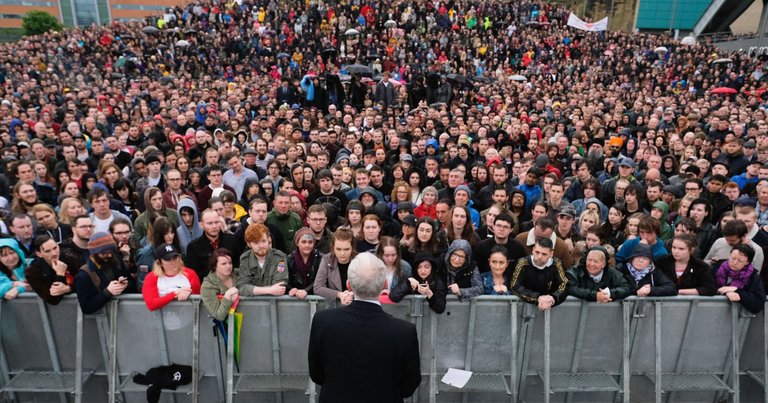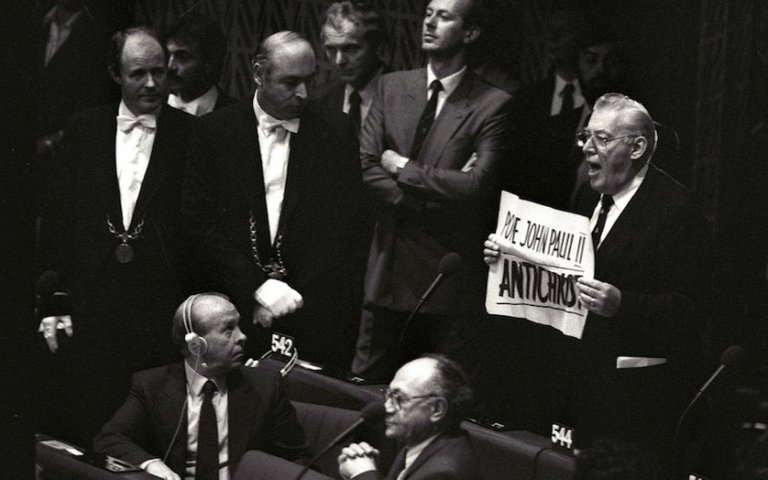The Labour party looked very weak prior to the election, in 2015 it had elected a leader, Jeremy Corbyn, who was more radical that any previous leader for at least 35 years if not ever. This split the party very bitterly, the centre-left parliamentary establishment versus the young, socialist and activist membership. The pundits and pollsters speculated that this infighting and the politics and personal history of the new leader would give the Tories a large majority and win with a double-digit lead in the vote share. After the election, had been called and the campaigns started however momentum immediately shifted to the labour party and the gap in polling narrowed rapidly in the run up to the election date with a powerful grassroots movement aiding Labour's chances.

Jeremy Corbyn speaking at a campaign rally
In the end the Conservatives dropped from 330 seats to 317 and still have a 50+ seat advantage over labour but would lose the necessary seats to control a majority(326+). In order for the Tories to pass bills and govern they would need the support from one of the smaller (mainly regional) parties. The problem with that is that nearly all the regional parties (Especially in Wales and Scotland) are left wing and as anti-Tory as the Labour party. The other small national parties that have seats have too few to matter and none are particularly close ideologically to the Conservative party anyway.
The only feasible party were a Northern Irish party, the Democratic Unionist Party(DUP). Northern Ireland is roughly half Scottish descended Presbyterian Protestants and half indigenous Catholic Irish and even though the terrorist violence has died down a lot since ‘The troubles’ period of the 70s-90s the sectarian division is still very sharp and identity politics is dominant. The DUP have also changed with the times but it is hard not to modernize from Britain’s Monty Python Martin Luther – Ian Paisley, founder and leader of the DUP from 1971-2008:

The image the modern DUP presents is of a far more professional, moderate and matured party but it’s politics are still firmly Right-wing Protestantism and far more socially conservative than the relatively liberal Tory party that supported and legalized gay marriage in England, are pro-choice and very secular.
Considering the Tories just lost because of an upsurge in young liberal votes, forming a government with the DUP is certainly a risk and is already emboldening the Labour support base into protests demanding fresh elections and causing calls from within her own party for the Prime minister, Theresa May, to stand down as leader.
Theresa May has not voiced any support for an upcoming election and claims the newly formed government will carry on for a full length in parliament. Given that many blame the election results on the notion that the British electorate believed the calling of this premature election was opportunistic Theresa might opt to avoid calling another election and let the parliament run its full course.
But how can she fulfill her promise and lead Britain out of the EU without a strong majority in parliament and a hostile opposition?
UK politics have been very unpredictable since 2015. No one expected a conservative majority in the General election of 2015, Brexit was seen as very unlikely in 2016 and this fresh election has again gone against the pundits.
Some things to look for in the coming weeks and months though:
- A leadership to challenge for control of the conservative party, many favor Boris Johnson or another strong supporter of Brexit
- Another Election being called
- A referendum on Brexit, this time between the choice of a conservative hard Brexit and Labour soft Brexit.
- Increased tension in Northern Ireland.
Some further reading:
https://www.theguardian.com/politics/blog/live/2017/jun/26/brexit-eu-nationals-theresa-may-to-meet-arlene-foster-in-hope-of-finalising-torydup-deal-politics-live https://www.theguardian.com/politics/2017/jun/09/from-climate-denial-to-abortion-heres-six-dup-policies-you-should-know-about